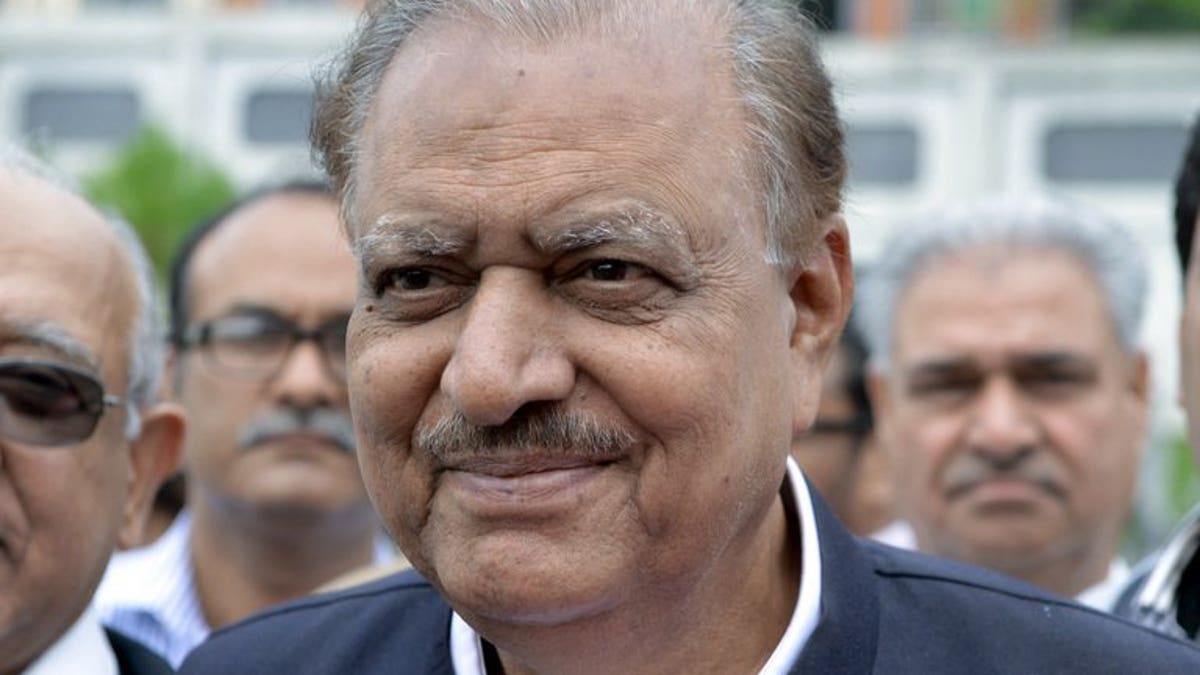
Pakistani presidential candidate for the ruling Pakistan Muslim League-N (PML-N) Mamnoon Hussain submits his nomination paper at the High Court in Islamabad on July 24, 2013. Pakistani lawmakers are set to elect a new head of state Tuesday, marking an end to the five-year term of outgoing President Asif Ali Zardari whose party lost May's general elections. (AFP/File)
ISLAMABAD (AFP) – Pakistani lawmakers are set to elect a new head of state Tuesday, marking an end to the five-year term of outgoing President Asif Ali Zardari whose party lost May's general elections.
Mamnoon Hussain, a businessman from the southern city of Karachi and close ally of Prime Minister Nawaz Sharif, is the most likely successor.
A long serving member of the ruling Pakistan Muslim League-N (PML-N), Hussain addressed a party meeting in Islamabad on Monday.
"Describing the office of president as the symbol of federation, the presidential candidate pledged to serve the country and its people in his capacity as president," a statement issued by Sharif's office said.
Zardari's opposition Pakistan People's Party (PPP) has boycotted the election, complaining it was not consulted on bringing the date forward from August 6, and its absence means Sharif's candidate is certain to win.
Hussain's loyalty to Sharif and low-profile will shore up the prime minister's authority and provide a stark contrast to Zardari, considered a sharp political operator behind the scenes.
Hussain first impressed Sharif in 1999 as president of the Karachi Chamber of Commerce and Industry (KCCI) and was made the governor of southern Sindh province.
"He had no political affiliation until 1999 but his polite discourse and professional ability impressed Nawaz Sharif who made him governor of Sindh," Azhar Haroon, the current president of KCCI, said.
In a reminder of the enormous challenges Pakistan faces, Taliban militants launched a brazen attack on a prison in the northwest of the country overnight, escaping with prisoners after a three-hour gunfight with security forces.
A debilitating power crisis also needs to be solved and US relations are complicated by drone attacks targeting militants.
Supporters say Hussain's election could be important domestically by giving the south some stake in the federal administration, otherwise dominated by Punjab, Sharif's power base.
Pakistani presidents are elected by the members of four provincial assemblies, and both houses of parliament.
There are two candidates: Hussain and respected, retired Supreme Court judge Wajihuddin Ahmed nominated by the third largest party of cricket hero Imran Khan.
Voting will begin at 10:00 am (0500 GMT) and last until 3:00 pm, with the result expected to be announced late on Tuesday.
Constitutional amendments passed by the last PPP government mean that the presidency is again a ceremonial post, a status likely to be cemented by the fact that Hussain has little personal clout.
Sharif won a commanding general election victory in May, which marked the first time a Pakistani civilian government completed a full term in office and handed over to another at the ballot box.
Political analyst Hasan Askari says Tuesday's election will return Pakistan to a strong executive prime minister and a ceremonial head of state.
"Mamnoon Hussain is a political lightweight and this is the reason Mr Sharif chose him to become the next president," he told AFP.
But the last PPP government had a turbulent relationship with Pakistan's top court and Askari warned that its boycott could lead to rocky relations with the PML-N.
"Mamnoon Hussain will be elected easily and it will be an easy walkover, but he will start his term with a strong controversy.
"In the long-term it will cause tensions between PPP and PML-N."
